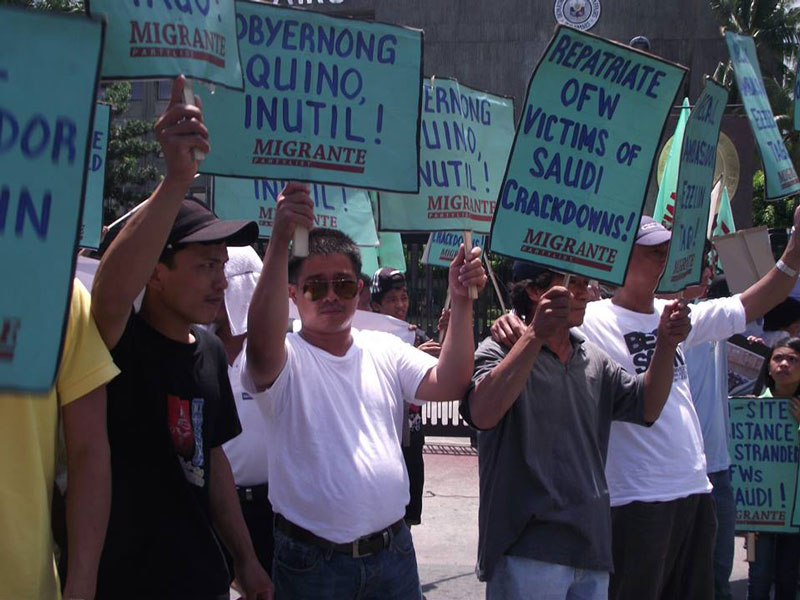
Returned stranded OFWs from Riyadh picket outside the DFA office in Manila last May 21. (photo from Migrante International’s Facebook page)
Gary Martinez, International Chairperson of Migrante says their organization has helped 15 of these OFWs finally return to the country last Saturday, two of them are from Davao City. “They can talk about how they were treated by embassy officials in Riyadh,” he says.
BY CHERYLL D. FIEL
Davao Today
DAVAO CITY, Philippines — For the past two months, the Philippine embassies in Jeddah and Riyadh at the Kingdom of Saudi Arabia are now called ‘tent cities’ as 4,000 Overseas Filipino Workers (OFWs) camped on its doorsteps.
They await action from Philippine consulate officials for repatriation as the Saudi government continues its crackdown on undocumented Filipino workers.
“They have bought pugon (heater). They have been staying there day and night,” says Gary Martinez, chair of the Filipino OFW group Migrante International in a phone interview with davaotoday.com.
Migrante laments that embassy officials are moving slow to repatriate thousands of migrant workers. Only close to 100 have returned but thousands languish on the embassy grounds.
Martinez said two OFWs have died from abject conditions in the tent city and have been brought home last week. The Saudi heat of 38 to 42 degrees Centigrade is unbearable for the Filipino workers including 100 children camping out on the embassy grounds, and their needs ranged from water and food rations, medicines and toilets.
The OFWs are bearing these conditions just to call the attention of the Philippine government to hear their demand.
Saudi crackdown on OFWs
Few months ago, the Saudi government announced the “Saudization Law,” the new policy of prioritizing their nationals in employment, thus easing out Filipino workers who are among the biggest group of nationalities populating Saudi Arabia. The policy is said to take effect on July 4.
The crackdown on OFWs began March 28, says Martinez, where Saudi authorities have reportedly swooped down hospitals, subdivisions and schools in search of Filipinos who are working without legal documents to support their employment.
There were OFWs according to Martinez who were apprehended by Saudi authorities and have been deported to the Philippines. He said a “news blackout by government on the incident prevented them from getting details.”
Worried OFWs have knocked on the Philippine embassy doors, only to be ignored and literally, shut off, Martinez said.
He added “(A)ll nationalities working in Saudi, the Indians, Nepalese, Bangladeshi, Sri Lankans and Pakistanis have been repatriated by their government. But Filipinos are camping out in our own embassies,” Martinez points out.
In Riyadh, Martinez says the Philippine Ambassador himself ordered the cut-off of water and electricity connection to some 200 OFWs encamped in the embassy’s old canteen. Even food and medicine were ordered embargoed, supposedly to discourage more OFWs from flocking to the embassy.
“But we are finding ways to supply food and water for our kababayans,” Martinez says. His group has sought homes where the OFWs can stay at day and return to the tent city at night.
“Their leaders have been sent home to stop the campout from increasing, there were harassments,” Martinez says, adding there are video documents to prove their claim.
He says Migrante helped 15 of these OFWs to finally return to the country last Saturday, two of them are from Davao City. “They can talk about how they were treated by embassy officials in Riyadh,” Martinez says.
About 100 Filipinos have been repatriated to the country so far in the wake of the crisis.
Wait-and-see mode
Martinez blames the wait-and-see stance of the Philippine government on the problem. “They never thought the Filipinos will flock to the consulates,” he says.
“Since September there was an enlistment for OFWs. It reached 7,000, yet the embassies have not done anything to facilitate their return,” Martinez added.
He cited delays in the process as the embassies are waiting for the Saudi Government’s Implementing Rules and Regulations.
Martinez expresses the OFWs’ worry over the delays. “Maybe nothing will happen until the July 4 deadline, and then everyone here in these camps will be detained.”
Martinez says they have also picketed the Department of Foreign Affairs (DFA) office in Manila to pressure prompt action from the Philippine government.
In a dialogue last April 30 between Migrante leaders and DFA Secretary Alberto Romulo, the secretary assured that the Philippine government will shoulder the OFWs travel expenses and penalties incurred in their employment, and that they can go as long as the Saudi government waive the “no-objection certificate,” a document to be secured by an OFW from his employer.
Philippine government officials, Martinez says, have assured that as long as the “no-objection certificate” requisite is foregone by the Saudi government, repatriation will then be easy. But days passed and as more Filipinos are flocking the embassies, they see nothing of it is coming yet.
“Do we have to wait for many of them to die at the camp?” Martinez asks.
Laid-back
Migrante has demanded President Aquino to act on their plight, but they find his laid-back stance appalling.
“We are asking President Aquino to speak for the OFWs, we are facing a humanitarian crisis. Many of our kababayans are affected,” Martinez says.
Martinez stresses that repatriating distressed Filipino workers in Saudi is an obligation of the Philippine government.
“They left the country legally, but they become victims of abusive bosses,” he says. Many of the OFWs in the ‘tent cities’ are victims of illegal recruitment, illegal trafficking, who are either victims of involuntary servitude and other maltreatment, such as non-payment and delayed wages, the withholding of travel documents, restriction on their freedom of movement and non-consensual contract alterations.
He said RA 8042 which was amended by 10022 clearly cites that it is the obligation of the state to repatriate every Filipino outside the country, whether they are “documented or undocumented.”
In fact, he says, there is an allotted PHP 100 Million which can be used for these instances.
The OFWs in the KSA is said to be the third largest source of the country’s remittances, next to United States and Canada. Aggregate remittances from OFWs all over the world stand at PHP 1.9 Billion for the first quarter alone of this year.
Martinez says, the Philippine government earns an average of PHP 23B a year from OFW remittances. He says part of such amount could have been used to help build industries and create jobs for Filipino workers rather than make them work out of the country subjected to vulnerable conditions.
But for now they want government to act immediately for the OFWs in Saudi Arabia.
“The OFWs in Saudi need immediate, free transportation back home. At the immediate, those who are camping at the embassy need food, water and shelter. We should not wait that many will fall sick or die before they act,” Martinez says.
Martinez announces that distressed OFWs from anywhere in the world can contact Migrante through online such as Facebook, Twitter and their website www.migranteinternational.org where they run a complaint form available for anyone who wishes to relay their concerns and seek help to fill out. (Cheryll D. Fiel/davaotoday.com)
davao, Jeddah, Kingdom of Saudi Arabia, Labor, Migrante, Migrants, migration, OFWs, Riyadh, Saudi









